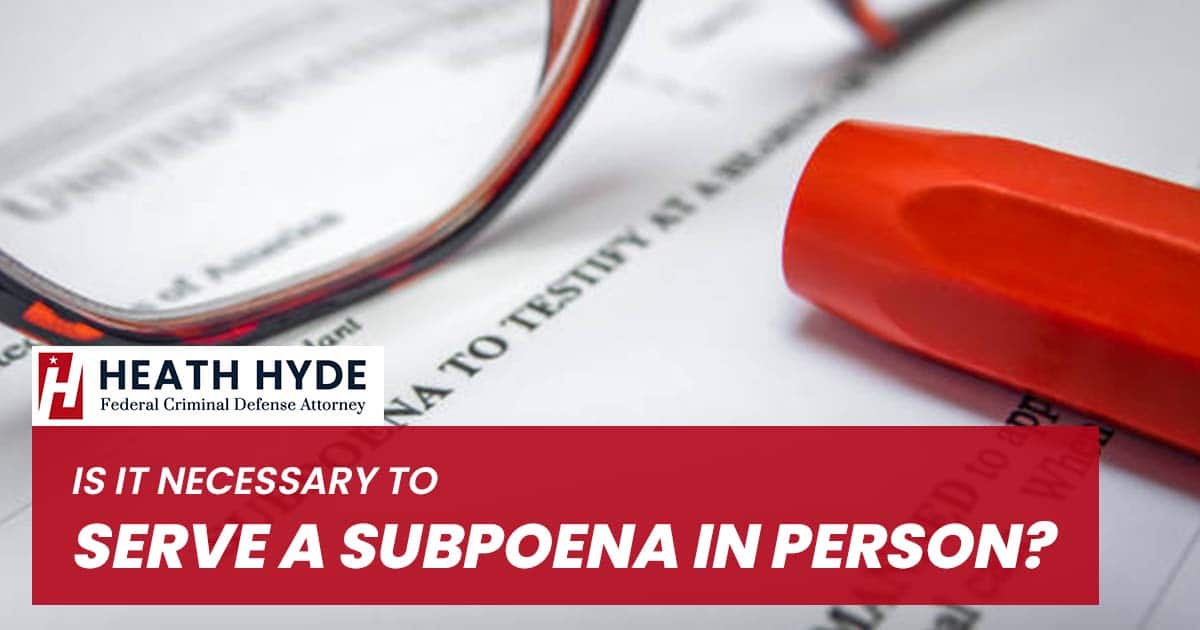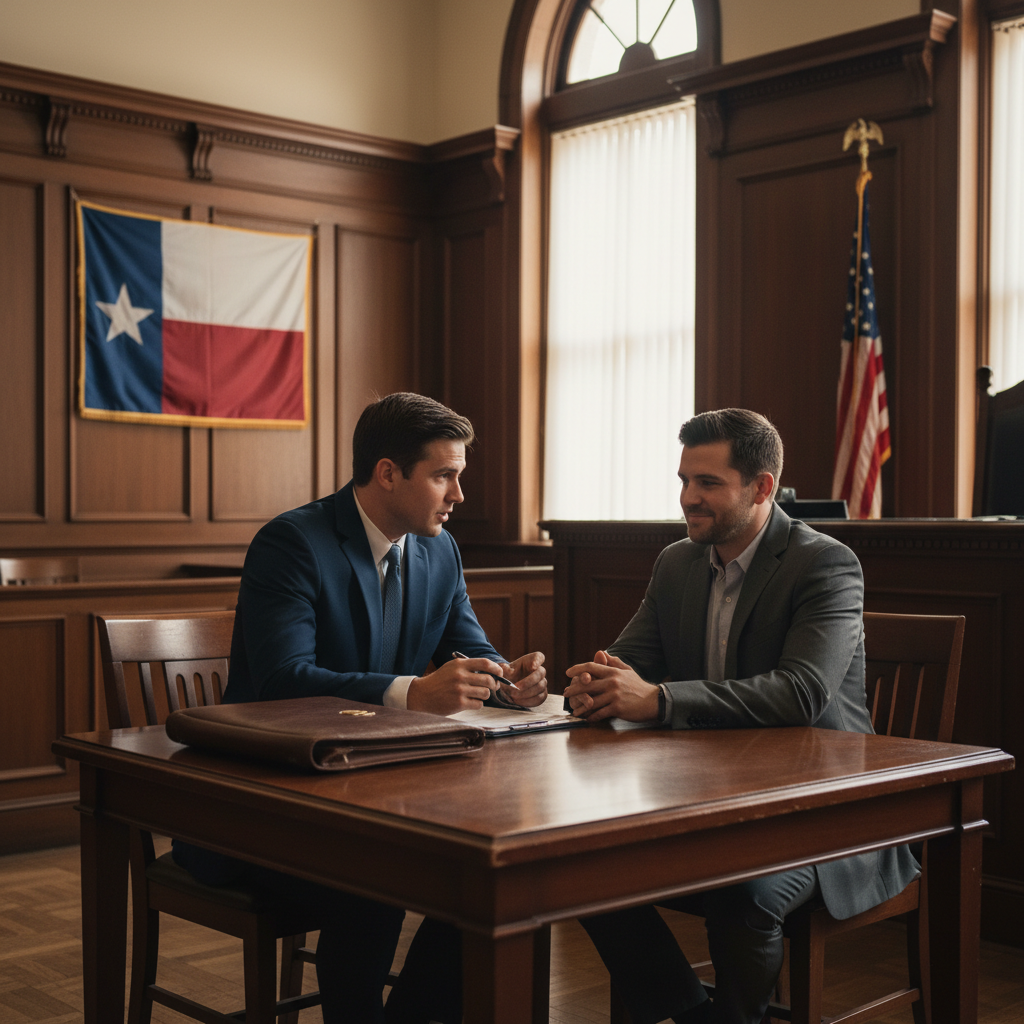When you’re served with a subpoena, you’re left with a lot of questions, and the subpoena itself doesn’t provide many answers. It also gives you very little time to get your bearings and make the critical decisions you need to defend yourself. If your subpoena arrived in the mail or was left on your doorstep, you might be thinking, “Does a subpoena have to be served in person?” “It depends,” unfortunately, is the answer to this query.
In truth, whether or not a subpoena must be served in person is determined by a variety of considerations. These include, for example:
- Is it a subpoena or a summons? Is it a judicial subpoena, an administrative subpoena, or a state attorney general’s office investigation subpoena?
- Was the subpoena issued by a state court judge or a federal district court judge if you were served with one?
- The service of the subpoena is governed by the laws of which jurisdiction?
While determining whether your subpoena required personal service may be difficult, it is critical—especially if you have been served as a suspect or target of a criminal law enforcement investigation. Not only may responding to a subpoena be a time-consuming procedure, but it can also be risky if you or your firm is facing criminal charges.
You may have grounds to bring a request to quash if your subpoena was not served in person and in-person service is required. While this may merely result in the subpoena being reissued and reserved, it can buy you valuable time and allow you to craft a strategic response to the government’s investigation.
State and Federal Subpoena Service Requirements: When Is In-Person Help Necessary?
Unfortunately, there are no universal guidelines when it comes to in-person service requirements for state and federal subpoenas. Not only do service obligations range from state to state, but even at the federal level, different courts and agencies have established varying rules and criteria.
“Substituted service” refers to service provided via means other than in-person delivery. Some states and federal agencies permit substituted service, while others do not. Furthermore, while some jurisdictions allow substituted service of subpoenas in certain circumstances, others demand in-person service.
1. Subpoenas Issued by the Federal Courts
In most circumstances, in-person service is required under Rule 45 of the Federal Rules of Civil Procedure (FRCP). Section (b)(1) of FRCP 45 specifically states:
“Any person above the age of 18 who is not a party to the proceedings may serve a subpoena.” Delivering a copy of a subpoena to the listed individual and, if the subpoena requires that person’s attendance, tendering the fees for one day’s attendance and the miles allowed by law are all part of serving the subpoena. When a subpoena is issued on behalf of the United States or any of its officials or agencies, no fees or mileage must be paid.”
The requirement of “delivering a copy to the identified individual” in the FRCP has been construed by the majority of federal courts as requiring in-person service via hand delivery. However, this demand for precise hand-delivery is not widespread. In the 2005 case of Hall v. Sullivan, the United States District Court for the District of Maryland concluded that FedEx service of a subpoena duces tecum complies with FRCP 45. According to the opinion.
“[W]here the only issue is document production, and the subpoenaed party need simply object to transfer the burden of proof to the asking party to file a motion to compel production of the sought papers, [the court sees] no reason to require in-hand delivery of subpoenas.” … [I]t is undisputed that [the subpoenaed party] got the subpoena and was allowed to protest and timely file a request to quash after receiving it. ………………………… As a result, delivery of the subpoena by Federal Express complied with Rule 45’s service requirements.”
In federal criminal prosecutions, the prevailing norm is that service must be done in person. This is based on Rule 17 of the Federal Rules of Criminal Procedure, which closely resembles the language of FRCP 45:
“A subpoena may be served by a marshal, deputy marshal, or any nonparty who is at least 18 years old.” The witness must receive a copy of the subpoena, as well as one day’s witness attendance fee and the legal travel allowance, from the server….”
2. Subpoenas Issued by the Federal Government
Administrative subpoenas are issued directly by federal authorities and do not need to be approved by a judge. They are effective investigative tools that grant investigating authorities broad powers to compel testimony and the production of documents in support of administrative, civil, and criminal accusations.
Each federal agency with subpoena power has the right to set the conditions for serving administrative subpoenas. Although particular requirements differ each agency, in general, agency guidelines allow for service via means other than hand delivery.
The Securities and Exchange Commission’s (SEC) Rule 150, for example, provides for service by any of the following methods:
Hand-delivery to the individual who is being served;
“Leaving a copy with a clerk or other person in charge of the person’s office;”
“Leaving a copy at the person’s dwelling residence or regular place of habitation with someone of sufficient age and discretion who is then resident therein;”
“Mailing the papers to the person by first-class, certified, registered, or Express Mail delivery through the United States Postal Service;”
“Sending the papers to the person via a professional courier service or express delivery service;”
“Transmitting the papers by facsimile machine,” if arranged in advance and reception is verified by mutually agreed-upon procedures; alternatively
If the party’s legal counsel has filed a notice of appearance pursuant to SEC Rule 102, service on the party’s legal counsel can be made by any of the methods listed above.
As a result, if you received an SEC subpoena, the form of service was almost definitely legitimate. Many (but not all) of the other federal entities with administrative subpoena power are in the same boat. Again, each agency has its own set of standards, and it will be required to analyze them in order to establish whether any given federal administrative subpoena is valid.
3. Subpoenas issued by state courts
At the state level, service by means other than in-person hand delivery is often more accepted. There is, however, significant variety between jurisdictions.
“A subpoena must be served by providing a copy to the witness and surrendering to that person any fees required by law,” the civil rules of procedure in Texas stipulate. The Texas Code of Criminal Procedure, on the other hand, clearly states that a subpoena may be served by:
“(1) reading the subpoena in the witness’s hearing; (2) delivering a copy of the subpoena to the witness; (3) electronically transmitting a copy of the subpoena to the witness’s last known electronic address, acknowledgment of receipt requested; or (4) mailing a copy of the subpoena by certified mail, return receipt requested, to the witness’s last known address…
Both civil and criminal subpoenas are subject to the same rules in New York. “[s]ervice must be made in the manner allowed by the civil practice law and rules for the service of subpoenas in civil cases,” says Section 610.40 of the New York Criminal Procedure Law (CPL). Hand delivery, mailing, delivery to the witness’s or party’s residence, fax, overnight delivery service, or delivery to the witness’s or party’s attorney are all options under Section 2103 of the New York Civil Practice Law and Rules (CVP).
4. Subpoenas from the Attorney General of the State
Subpoenas issued by the state attorney general are subject to the same rules as subpoenas issued in other state civil and criminal actions. As a result, if you are the subject of a state attorney general investigation and have received a subpoena, or if you have been called as a witness, you should consult with an attorney to determine whether in-person delivery is required.
If You’ve Been Served With a Subpoena, You Should Contact Defense Counsel As Soon as Possible.
It is critical that you retain defense counsel as soon as possible, regardless of the sort of subpoena you have received or the method by which it was served. If you fail to object to the subpoena within a reasonable time after receiving it, you may be believed to have “waived” your right to challenge its delivery method. In any instance, you must answer to the subpoena properly and avoid unintentionally or unduly disclosing material that could expose you to litigation or prosecution.
Speak with a Grand Jury Subpoena Attorney at Heath Hyde Today
Have you ever received a subpoena? Are you concerned that the subpoena was delivered incorrectly or is otherwise invalid? Call 903.439.0000 or get a free case evaluation online now to talk with one of our senior defense attorneys in confidence.
Heath Hyde, the firm’s founder, concentrates his litigation practice on white-collar criminal defense, government investigations, SEC and FCPA enforcement, and Federal Health Care Fraud.
Heath Hyde is one of the greatest federal defense litigation lawyers in the country. Heath offers you the immediate impression of being completely safe. He is courteous, respectful, and enthralling. His legal technique worked just perfectly.






